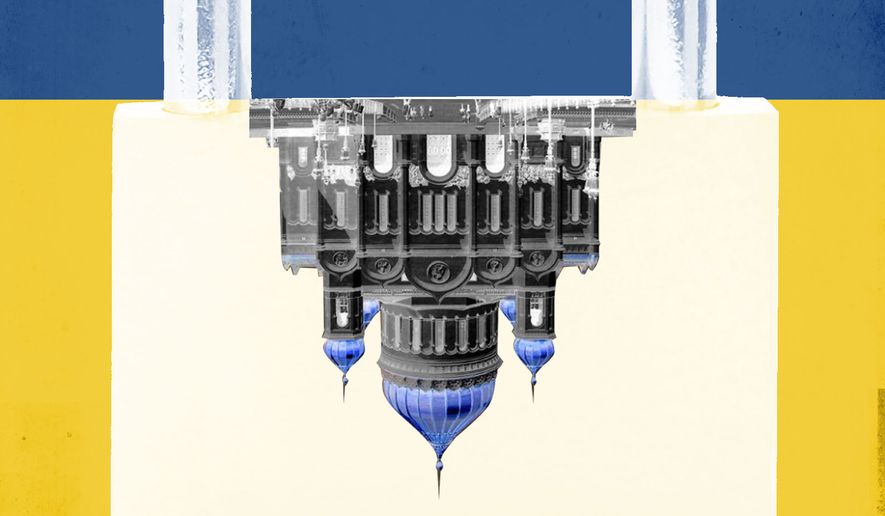OPINION:
We have been to Ukraine and seen priests who were beaten up by soldiers, their churches desecrated and shelled. It wasn’t done by Ukraine but by Russia, the only actor in the region actively persecuting Christians. Moscow has attacked Christians in occupied Ukraine and weaponized religion to hurt the country from within. Now, Ukrainian authorities are taking action.
Ukraine formally recognized that the Ukrainian Orthodox Church-Moscow Patriarchate failed to break ties with Moscow and filed a lawsuit to ban its operations within the country. Predictably, critics will frame this as religious persecution, but they are wrong. This is about national security, and it mirrors actions taken by dozens of democracies around the world, including much of Europe and even the United States, to protect themselves from hostile foreign empires. The move has robust support within Ukraine, with 85% of the largely Christian population in favor of taking action against the church.
The UOC-MP’s parent body, the Russian Orthodox Church, is a working arm of the Kremlin and has been complicit in Russia’s invasion of Ukraine. Patriarch Kirill, a former KGB officer who leads the church, endorsed Russia’s invasion, declaring it a holy war against Ukraine and the West and telling Russian troops that if they die fighting, all their sins will be washed away. We detail this dynamic in a short film, “Ukraine’s Christians vs. Putin’s Church — Explained.”
Ukraine has documented numerous cases of UOC-MP clergy supporting Russia’s war. Priests have been charged with espionage, spreading pro-Russian propaganda, and even assisting Russian military operations, using their positions as clergy to pass intelligence, hide weapons and shelter occupying troops.
Still, there will likely be outcry from Russia apologists such as Candace Owens and Tucker Carlson, who will claim that Ukraine is persecuting Christians. The facts show otherwise.
As protected by their constitution, Ukrainians are free to practice all faiths. Orthodox Ukrainians, who make up the majority of the population, are not deprived of worship. More than 7,600 congregations are affiliated with the independent Orthodox Church of Ukraine, a thriving alternative to the UOC-MP. If the court rules to ban the UOC-MP, affiliated parishes would not be shuttered; rather, they would be able to become independent or join another church.
Ukraine’s goal is to protect religion while rejecting institutional arrangements that subordinate spiritual authority to hostile foreign control. This approach is consistent with the way other democracies defend themselves. The American Colonies dissolved ties with the Church of England during the Revolutionary War because its clergy swore loyalty oaths to King George III. More recently, the Czech Republic, Finland, Sweden, Bulgaria and others have restricted their Russian Orthodox Church affiliates.
Russian ruler Vladimir Putin views the UOC-MP as a critical tool in his efforts to undermine Ukraine, which was why he raised “protections” for it as a key negotiating demand during his meeting with President Trump in Alaska. Does Mr. Putin really care about freedom of religion? Or does he care about his ability to maintain influence in Ukraine? Looking at his track record on religious freedom, it appears to be the latter.
In Russian-occupied Ukraine, Christianity is under attack. Since its full-scale invasion, Russian forces have damaged or destroyed 650 churches and killed 49 faith leaders. As detailed in “A Faith Under Siege,” pastors and priests have been kidnapped, tortured and killed. Church services have been raided and religious literature banned and burned.
Protestant pastors are about 10 times more likely than other denominations to be murdered by Russian forces, but all faith communities are suffering. Jehovah’s Witnesses and Greek Catholics have been outlawed by Russian authorities, and the Catholic Church has been systematically dismantled.
Orthodox Christians have not been spared. Russia has killed 14 Orthodox priests and destroyed countless Orthodox churches. On our last trip to Ukraine, we met two former UOC-MP priests who assumed they were safe when Russian forces took over their towns in the Brovary District. One had his church desecrated, its icons defaced by drunken soldiers and its bell tower turned into a sniper’s nest. Another had his ribs broken and his teeth knocked out before being paraded naked through the streets. Both priests survived, and both moved their parishes to the independent Orthodox Church of Ukraine soon after Ukrainian troops liberated their towns.
Mr. Putin’s pleas for “security guarantees” for UOC-MP churches are not the demands of a leader concerned about faith but rather are part of a ploy to maintain a grip on Ukraine. If the UOC-MP refuses to break with Moscow and Ukrainian courts move to ban its operations, Ukraine will be more secure and the country’s tradition of religious freedom will remain intact. The better route would be for the UOC-MP to, like the priests we met in the Brovary District, finally (and formally) break ties with Moscow.
• Colby Barrett, JD, PE, is an entrepreneur, filmmaker and former U.S. Marine Corps captain who led infantry and scout/sniper platoons in the Pacific Rim and Middle East. He is the producer of “A Faith Under Siege.” Steven Moore is a former chief of staff to a Republican member of the U.S. House of Representatives and founder of the Ukraine Freedom Project. He is an executive producer of “A Faith Under Siege.”




Please read our comment policy before commenting.